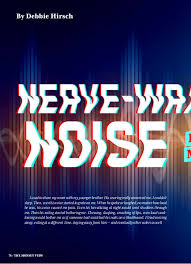 If you are one of the rare individuals who suffer with the noise syndrome known as misophonia, you are probably aware of the torment that patients go through in their daily life. Any small sound could trigger a big reaction. This syndrome can lead to significant anxiety, consistent overwhelming emotions and feelings, and even depression and suicidal thoughts. No matter how severe or mild your symptoms are, misophonia is a strongly displeasing issue to deal with every day. Living your life in fear of sound and in constant panic is no way to spend your time. If you’re new to misophonia and are wondering if your syndrome is directly connected to the development of anxiety, or vice versa, we can help you understand the nitty and gritty of the illness. The better you understand misophonia as a whole, the more you can improve your daily life and future.
If you are one of the rare individuals who suffer with the noise syndrome known as misophonia, you are probably aware of the torment that patients go through in their daily life. Any small sound could trigger a big reaction. This syndrome can lead to significant anxiety, consistent overwhelming emotions and feelings, and even depression and suicidal thoughts. No matter how severe or mild your symptoms are, misophonia is a strongly displeasing issue to deal with every day. Living your life in fear of sound and in constant panic is no way to spend your time. If you’re new to misophonia and are wondering if your syndrome is directly connected to the development of anxiety, or vice versa, we can help you understand the nitty and gritty of the illness. The better you understand misophonia as a whole, the more you can improve your daily life and future.
What is Misophonia?
 The syndrome of misophonia strictly relates to the irritation and negative reactions that come after hearing or experiencing a certain noise, which we call a trigger. These sounds can be different for all individuals and usually depend on the way you were raised or what you have been classically conditioned to dislike. This means people who are affected by misophonia are likely not born with the syndrome. Because of this, it is harder to identify or pinpoint specific events that may have led to the cause of your misophonia. Undergoing therapeutic courses of treatment may help alleviate symptoms and possibly find the reason for your irritations or phobias. Dealing with misophonia is a very difficult process that should be addressed as soon as symptoms are apparent for the best results.
The syndrome of misophonia strictly relates to the irritation and negative reactions that come after hearing or experiencing a certain noise, which we call a trigger. These sounds can be different for all individuals and usually depend on the way you were raised or what you have been classically conditioned to dislike. This means people who are affected by misophonia are likely not born with the syndrome. Because of this, it is harder to identify or pinpoint specific events that may have led to the cause of your misophonia. Undergoing therapeutic courses of treatment may help alleviate symptoms and possibly find the reason for your irritations or phobias. Dealing with misophonia is a very difficult process that should be addressed as soon as symptoms are apparent for the best results.
What is Anxiety?
Anxiety is defined as a disorder characterized by fears or irritants that negatively affect how a person can regularly go about their day. Most of the time, anxiety is a normal and healthy emotion, as it regulates the body’s alertness. However, some people may have more advanced stages of anxiety that cause symptoms to appear consistently throughout the day. Anxiety is a very common disorder in the world, there being over 3 million cases in the United States alone. Anxiety is a difficult illness to deal with and may be related to symptoms of misophonia.
Are they Related?
 After studies were completed examining patients who show signs of both anxiety and misophonia, psychologists and medical providers have determined they are two separate disorders with separate triggers and symptoms. Regardless of them being different conditions, this doesn’t mean they can’t go hand in hand with another. Similar studies depicted that misophonia can lead to anxiety. Because misophonia may trigger heightened sensory states and lead to panic, it can be identified that anxiety can be a symptom of misophonia, but it is unlikely the opposite. Misophonia begins with external stimuli, while anxiety typically occurs internally. If you have misophonia and are being treated like you have anxiety, there may be better solutions to your daily suffering.
After studies were completed examining patients who show signs of both anxiety and misophonia, psychologists and medical providers have determined they are two separate disorders with separate triggers and symptoms. Regardless of them being different conditions, this doesn’t mean they can’t go hand in hand with another. Similar studies depicted that misophonia can lead to anxiety. Because misophonia may trigger heightened sensory states and lead to panic, it can be identified that anxiety can be a symptom of misophonia, but it is unlikely the opposite. Misophonia begins with external stimuli, while anxiety typically occurs internally. If you have misophonia and are being treated like you have anxiety, there may be better solutions to your daily suffering.
Get Treatment Today
In order to feel as good as you possibly can in life, it is important to visit a doctor or misophonia specialist to discuss symptoms and potential treatment options. Steven Katz LCSW is one of the best misophonia treaters in New York City and can significantly improve your symptoms.
Contact the Misophonia Cognitive Center to set up an appointment and start managing your Misophonia today.
